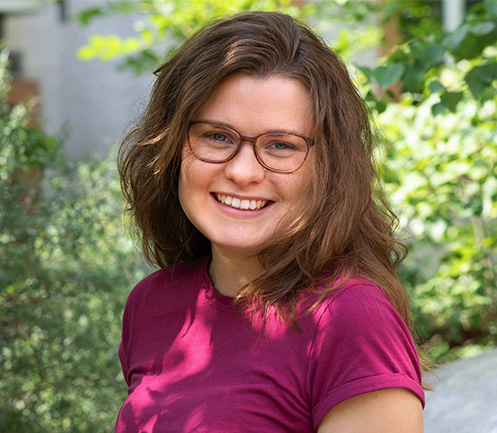Kerstin Strenger
 From: I was born in Frankfurt am Main in Germany
From: I was born in Frankfurt am Main in Germany
Speaks: German, English
In three words: Creative, Reflective, Open-minded
Where would you be if you could be anywhere else right now? At the moment, the weather is becoming really nice, so I would be sitting in a small, old piazza somewhere in Tuscany with a good Italian coffee, watching the relaxed hustle and bustle around me, listening to the street musicians and enjoying the sun on my face. Luckily, I’ve heard that the train connections to Italy from Basel are very good, I definitely have to try that out soon.
More about Kerstin
Route to PhD
My path into science started in school, where engaged teachers aroused my curiosity for natural science and biological questions. After school, I began training to be a nurse. However, I realised that I really enjoyed the scientific part of the medical education. I wanted to know and learn more, so decided to study classical biology in Marburg for my Bachelors degree. My Masters degree was at the Max Planck Institute with Prof. Knut Drescher, where I further specialized in Microbiology and Infection Biology. Afterwards, I continued to work in the lab where I then heard about the NCCR Fellowship programme.
Facing Challenges and Staying Motivated
Especially in academic life, you can sometimes get the feeling of never being or doing enough. Always believing in yourself and your abilities is sometimes not easy, but it helps to have great colleagues and friends to talk to.
It motivates me that I am able to work in a research area that is of great interest to me. The speed at which new methods develop, providing information that would have been inaccessible just a few years ago, fascinates me. But you also have to accept that new methods take time until they work smoothly. Then you need to have patience and accept that there will be good days and bad days.
Unique and Collaborative Fellowship Experience
A typical day as a PhD student at AntiResist is very diverse and every day is different from the day before. I spend a lot of time in the lab doing experiments, but also attending meetings or analysing my results. I like to attend interesting talks from international scientists, as well as scientists from the University of Basel, to learn about their perspectives. Ideally, I also have time for a quick coffee break with my colleagues to discuss our problems, new findings and discuss our experiences.
So far, becoming an NCCR Fellow was the greatest achievement in my academic career and it is a great honour to be able to experience this, and be able to work alongside great scientists and learn from them. The AntiResist PhD Fellowship enables me to work in close collaborations with different labs and combines my passion for microbiology with my interest in clinical questions which is really great and unique. I believe that translational research plays a very important role as a bridge between basic and clinical research and I am happy to learn more and be part of it.
I hope that my research can help to better understand what is happening between bacteria and the immune system during an infection. I also hope to learn a lot and develop a skill set which enables me to contribute to the elimination of the ever-growing problem of treating bacterial infections.
Advice to Fellowship applicants
Take your time to find out what interest you the most and what is your passion. You can always speak with other scientists to get more information about the programme and listen to their experiences in academia. If you are invited for an interview, show your motivation and believe in yourself and the skills you developed during your undergrad education.
Parting Words
“Science knows no country, because knowledge belongs to humanity, and is the torch which illuminates the world.”
I really like this quote from Louis Pasteur. To me it means that science has the potential to transcend borders and bring all people together to work and uncover solutions for the challenges that afflict our world. This is one of the many reasons why I really appreciate being part of the scientific community.

